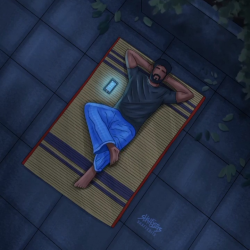

Take a trip back in time and explore various cultural traditions as we explore the old stories that have influenced how people perceive the world. Discover the beginnings of the universe and our place in it through the seven oldest creation myths from around the world. Come explore the intricate web of myth, folklore, and belief that enthralls and motivates us even now, spanning from Mesopotamia to Mesoamerica."
1. Myth of Norse Creation
According to Norse mythology, Ginnungagap, the primordial emptiness, was the beginning of the world. Ymir, a monster composed of ice, was the first creature to emerge from the emptiness. Odin and his brothers killed Ymir, using his body to construct the universe. They created the sky from his skull, the oceans from his blood, and the earth from his body. The sun, moon, and stars were made from the embers and sparks of Muspelheim, the kingdom of fire.
Then, using two trees they discovered on the coast, Odin and his brothers built Ask and Embla, the first people. While his brothers gave them bodily characteristics, Odin gave them life and intelligence.
According to the Norse creation story, the cosmos was once filled with chaos and violence, but the gods used the remnants of the primordial giant to bring order to it. It illustrates the brutality and unpredictability of the Norse world as well as the value of bravery, shrewdness, and strength in the face of difficulty.
2. The Hindu Creation Myth
According to the Hindu creation story, the universe had no form or structure and was initially just a state of chaos and darkness. Out of this turmoil, the god Brahma separated the elements of earth, water, fire, air, and ether to create the cosmos. The gods and the devils were the first creatures that Brahma created.
But the gods and the demons could not live in harmony, so they engaged in a fierce war in which the gods prevailed. Then the gods requested that Brahma create people to worship and assist them.
The earliest people were made by Brahma, but they lacked knowledge and comprehension and were flawed. The gods corrected this by teaching mankind how to conduct rites and ceremonies and by giving them the Vedas, a compilation of holy writings.
3. Genesis Eridu
An old Mesopotamian creation story that describes the beginnings of the planet and humans is called the Eridu Genesis. The story starts with the gods' creation and their establishment on Earth by the god of wisdom, Enki. After then, Enki made humanity out of clay and sent them to serve the gods.
As time went on, humans became too loud and numerous to please the gods. The gods chose to kill humanity with a flood, but Enki sent a warning to one man, Ziusudra, telling him to build a boat so he and his family could survive.
After surviving the flood, Ziusudra received an endless life recompense from the gods. A hymn honoring Enki for his wisdom and his part in creating the world and rescuing humanity ends the story.
4. Enuma Elish
An old Babylonian creation story explaining the origins of the planet and humanity is called Enuma Elish. The god Tiamat, who is the embodiment of chaos, is used in the tale to describe the initial state of the universe. Two more gods arose from this chaos: Apsu, the freshwater god, and his partner, Tiamat's mate.
Apsu intended to kill his consort's children since they were unruly and noisy.
But one of his kids, Ea, killed Apsu instead, and thwarted his scheme. Outraged over her mate's death, Tiamat set out to build an army of monsters to exact revenge. In addition, she gave birth to Kingu, her new consort, and bestowed upon him the Tablets of Destiny, which endowed him with omnipotence.
5. The Greek Creation Myth
Greek mythology holds that the primordial gods Chaos, Gaia (Earth), and Eros (Love) are responsible for the universe's genesis. The mythology describes chaos as the universe's original state—a void filled with nothingness and darkness. From chaos arose Gaia, who came to symbolize the Earth, and Eros, who stood for the power of attraction and love.
The sky, Uranus, was subsequently born from Gaia, making them the first celestial pair. The twelve Titans, the three Cyclopes, and the three Hecatonchires (giants with one hundred arms each) were among their numerous offspring. But as a harsh and controlling father, Uranus locked the Cyclopes and Hecatonchires away in Tartarus, the lowest realm of the underworld.




